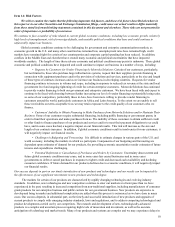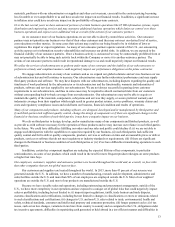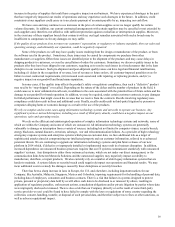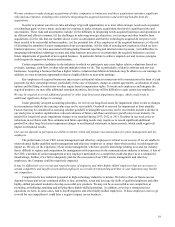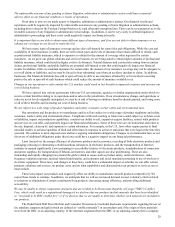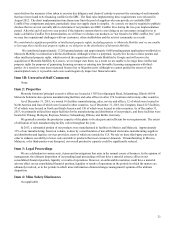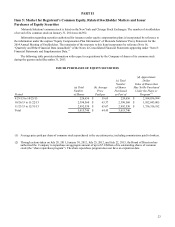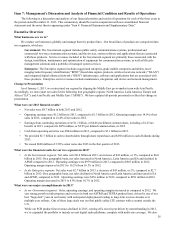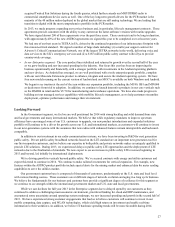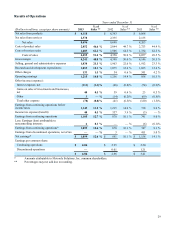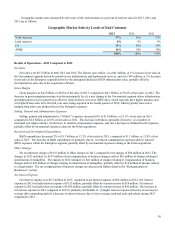Motorola 2013 Annual Report Download - page 22
Download and view the complete annual report
Please find page 22 of the 2013 Motorola annual report below. You can navigate through the pages in the report by either clicking on the pages listed below, or by using the keyword search tool below to find specific information within the annual report.20
The unfavorable outcome of any pending or future litigation, arbitration or administrative action could have a material
adverse effect on our financial condition or results of operations.
From time to time we are made a party to litigation, arbitration or administrative actions. Our financial results and
reputation could be negatively impacted by unfavorable outcomes to any pending or future litigation or administrative actions,
including those related to the Foreign Corrupt Practices Act and other anti-corruption laws. There can be no assurances as to the
favorable outcome of any litigation or administrative proceedings. In addition, it can be very costly to defend litigation or
administrative proceedings and these costs could negatively impact our financial results.
It is important that we are able to obtain many different types of insurance, and if we are not able to obtain insurance or we
exhaust our coverage we are forced to retain the risk.
We have many types of insurance coverage and are also self-insured for some risks and obligations. While the cost and
availability of most insurance is stable, there are still certain types and levels of insurance that remain difficult to obtain, such
as professional liability insurance, which is expensive to obtain for the amount of coverage often requested by certain
customers. As we grow our global solutions and services business we are being asked to obtain higher amounts of professional
liability insurance, which could result in higher costs to do business. Natural disasters and certain risks arising from securities
claims, professional liability and public liability are potential self-insured events that could negatively impact our financial
results. In addition, while we maintain insurance for certain risks, the amount of our insurance coverage may not be adequate to
cover all claims or liabilities, and we may be forced to bear substantial costs from an accident, incident or claim. In addition,
businesses that Motorola Solutions has sold or spun off may be able to use insurance obtained by us for incidents occurring
prior to the sale or spin-off of such business which could reduce the amount of insurance available to us.
Changes in our operations or sales outside the U.S. markets could result in lost benefits in impacted countries and increase our
cost of doing business.
We have entered into various agreements with non-U.S. governments, agencies or similar organizations under which we
receive certain benefits relating to its operations and/or sales in the jurisdiction. If our circumstances change, and operations or
sales are not at levels originally anticipated, we may be at risk of having to reimburse benefits already granted, and losing some
or all of these benefits and increasing our cost of doing business.
We are subject to a wide range of product regulatory and safety, consumer, worker safety and environmental laws.
Our operations and the products we manufacture and/or sell are subject to a wide range of product regulatory and safety,
consumer, worker safety and environmental laws. Compliance with such existing or future laws could subject us to future costs
or liabilities, impact our production capabilities, constrict our ability to sell, expand or acquire facilities, restrict what products
and services we can offer, and generally impact our financial performance. Some of these laws are environmental and relate to
the use, disposal, clean up of, and exposure to certain substances. For example, in the U.S., laws often require parties to fund
remedial studies or actions regardless of fault and often times in response to action or omissions that were legal at the time they
occurred. We continue to incur disposal costs and have ongoing remediation obligations. Changes to environmental laws or our
discovery of additional obligations under these laws could have a negative impact on our financial performance.
Laws focused on: the energy efficiency of electronic products and accessories; recycling of both electronic products and
packaging; reducing or eliminating certain hazardous substances in electronic products; and the transportation of batteries
continue to expand significantly. Laws pertaining to accessibility features of electronic products, standardization of connectors
and power supplies, the transportation of lithium-ion batteries and other aspects are also proliferating. There are also
demanding and rapidly changing laws around the globe related to issues such as product safety, radio interference, radio
frequency radiation exposure, medical related functionality, and consumer and social mandates pertaining to use of wireless or
electronic equipment. These laws, and changes to these laws, could have a substantial impact on whether we can offer certain
products, solutions and services, on product costs, and on what capabilities and characteristics our products or services can or
must include.
These laws impact our products and negatively affect our ability to manufacture and sell products competitively. We
expect these trends to continue. In addition, we anticipate that we will see increased demand to meet voluntary criteria related
to reduction or elimination of certain constituents from products, increasing energy efficiency, and providing additional
accessibility.
We may be unable to obtain components and parts that are verified to be Democratic Republic of Congo ("DRC") Conflict
Free, which could result in a reputational damages if we disclose that our products include minerals that have been identified
as “not found to be DRC conflict free” or if we disclose that we are unable to determine whether such minerals are included in
our products.
The Dodd-Frank Wall Street Reform and Consumer Protection Act included disclosure requirements regarding the use of
tin, tantalum, tungsten and gold (which are defined as “conflict minerals”) in our products and if the origin of these materials
were from the DRC or an adjoining country. If the minerals originated from the DRC or an adjoining country then a company


